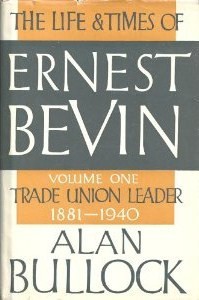The ceaseless labors of a trade union leader

When he died in 1951 Ernest Bevin was eulogized by many for his decade-long service as a cabinet minister. As Minister of Labour in Winston Churchill’s wartime government, he presided over the mobilization of the British workforce for the war effort, while as Foreign Secretary in the postwar Labour government he worked for the reconstruction of Europe and shaped the West’s response to the challenge posed by the newly-dominant Soviet Union. Yet this remarkable period came after a long career as a labor organizer, during which he played a pivotal role in the growth of British unions during the first half of the 20th century.
It is this period of Bevin’s life that is the focus of the first book in Alan Bullock’s three-volume account of his life and achievements. An academic best known for writing the first complete biography of Adolf Hitler, Bullock was invited by Arthur Deakin, Bevin’s successor as the general secretary of the Transport and General Workers’ Union (TGUW), to chronicle Bevin’s multifarious achievements. Bullock rose to this challenge by authoring one of the great works of modern political biography, one that details Bevin’s lifelong efforts on behalf of the workers and the nation he held so dear.
As Bullock details, Bevin’s life of labor began at an early age. Growing up in rural Somerset, Bevin was forced at a young age to quit school and seek work as an agricultural laborer. After moving to Bristol, Bevin was employed in a number of different jobs before finding his calling as a labor organizer for the Dockers’ Union. Bullock shows how Bevin’s work as a labor leader was not just a career but a passion, one in which he invested an enormous amount of his time and energy, often to the point of exhaustion.
Such commitment was necessary given the challenges facing the labor movement in Britain at that time. One of the many strengths of Bullock’s book is in how he sets Bevin’s life in the context of an era, one in which unions struggled against numerous challenges to their existence. He credits Bevin with much of their success during their period, thanks to such achievements as his contributions to the postwar Shaw Inquiry and his key role in the formation in 1922 of the TGWU, his position in which cemented Bevin’s place at the forefront of Britain’s labor leadership.
While Bullock spends the bulk of the book describing Bevin’s many activities, he also draws from them a deeper understanding of his views and motivations. Though Bevin was a committed socialist from an early age, Bullock notes his longstanding ambivalence towards the Labour Party and particularly towards the intellectuals who shaped much of its ideology. In his view, their ideas all too often lacked a grounding in the realities facing the British working class. These Bevin was all too familiar with, as his duties as general secretary often took him across the length and breadth of the country and brought him into direct contact with the circumstances workers faced. Informed by such experiences, Bevin often found the political party claiming to be working on their behalf to be far too detached from problems they sought to address.
Nevertheless, Bevin became more invested in political solutions to these problems over the course of his career. As Bullock shows, this was a consequence of the setbacks facing the labor movement in the interwar era. With Britain’s global economic dominance eroding, workers often experienced the effects of this in the form of reduced wages and high unemployment. Despite his success in organizing workers, Bevin emerged from the famous General Strike of 1926 with a painfully-earned lesson in the limits of direct action. In its aftermath, he increased his involvement in politics, participating in Labour’s victory in the 1929 general election and helping to rebuild the party after their setbacks two years later. Though Bevin was periodically offered opportunities to stand for Parliament during the interwar era, he preferred to work from outside as a union leader, and it was only the demands of war in 1940 that compelled him to abandon his longstanding reluctance to serve in government and accept Winston Churchill’s offer to become Minister of Labour.
By the end of the book, Bullock has left his readers with a thorough grasp of Bevin’s accomplishments as a labor leader. Had he retired as general secretary in 1941 as he intended Bevin still would have lived a life deserving to be written about. As a prelude to his even more noteworthy achievements, though, it is even more worthy of study. Though clearly an admirer of Bevin’s, Bullock is critical enough to draw out key insights that provide a better appreciation of his subject’s views and motivations. His immersion in it results in a text that is often dense with details, but no less readable for it. It’s a book that is absolutely indispensable for anyone seeking an in-depth understanding of one of the greatest figures in modern British history, and it stands as a monument to his lifetime of ceaseless effort.
 3
3






